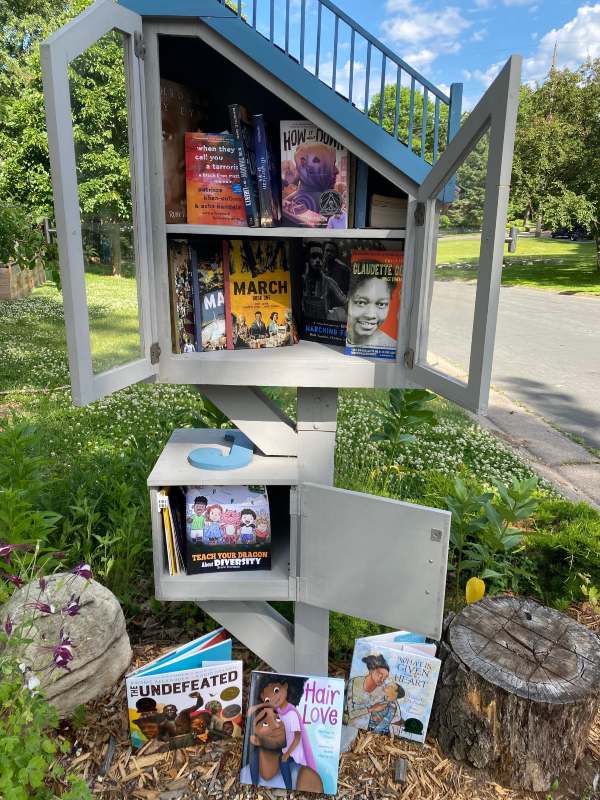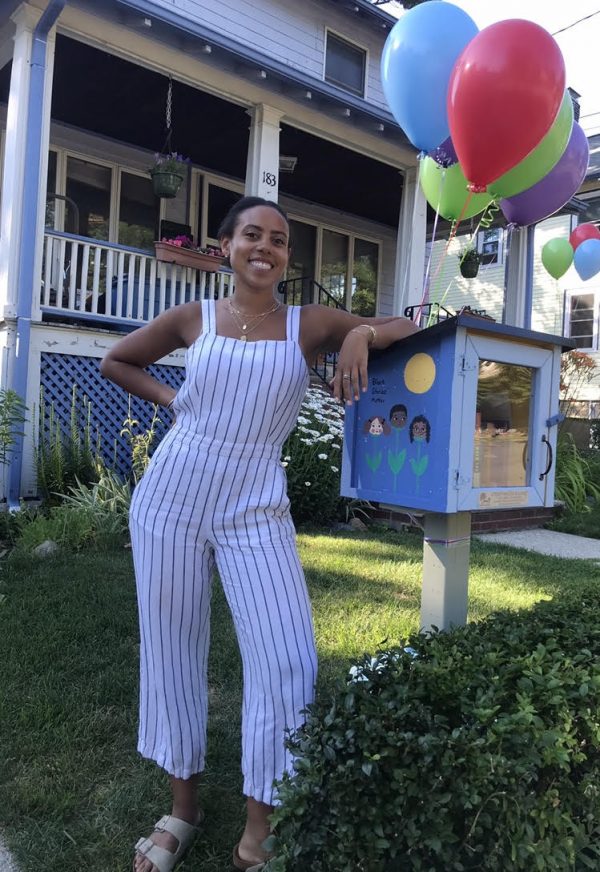This summer, readers are flooding Little Free Library book-sharing boxes with diverse books that amplify Black voices. Sarah Kamya, a New York high-school counselor and Little Free Library steward, is a champion of this movement. She began filling her local little libraries with diverse books in early June, and has now shipped hundreds of books to little libraries across the country through her Little Free Diverse Libraries project.
“As a school counselor in a K-8 Title 1 school in New York City, I find books to be such an important place where one can build their self-confidence and self-worth, start conversations, and create change,” Sarah said. “I believe that Black and brown children deserve to see themselves represented in books and that if you cannot see it, you cannot be it. Some of my favorite books have been discovered in Little Free Libraries, and I am so excited for others to discover books they may have never seen, books they wish they had seen, and books that create conversations and change for years to come.”

Through her phenomenal initiative, Sarah purchases books for children and adults by Black, Indigenous and People of Color (BIPOC) authors and ships them to locations where Little Free Libraries can benefit from diverse books. The books are funded through donations and are often purchased from Black-owned bookstores. While the project initially focused on the little libraries in Arlington, Massachusetts, where Sarah is staying during the pandemic, it quickly spread to include all 50 U.S. states.
Sarah is not alone in her efforts to amplify BIPOC voices through Little Free Libraries, with diversity-themed libraries popping up over the last several years. Following the murder of George Floyd in Minneapolis, many stewards in the Little Free Library community pledged to work harder to diversify the contents of their little libraries as a way to promote education and understanding. At the Little Free Library nonprofit organization, where inclusion and representation are central tenets, we dedicated our monthly book giveaways to anti-racist and social-justice books, worked with PBS Kids on a summer story-time initiative to highlight diverse books and readers, and set in motion a project to serve the Minneapolis community.

We are grateful for Sarah’s work to make BIPOC voices heard. While we know that there is much more work to be done, we believe that books can be part of the solution. Here, Sarah talks about the importance of diverse books, gives us an update on her Little Free Diverse Libraries project, and provides a list of her ten favorite diverse children’s books. (It’s a good one!)
What inspired you to start your Little Free Diverse Libraries project?
The mission for this project started when I was on one of my daily walks through my town of Arlington, Massachusetts. There is a Little Free Library right by my house which I pass every day. I always stop to check out the books and I was thinking how great it would be to fill these libraries in my community with more diverse books. My town is made up of 83.6% white people and 2.63% African-Americans, and while it is not my job to educate the white folk in this community I believe in the power of books and I believe that books have the power to start conversations and create change. When I was growing up in Arlington, I rarely saw any Black or brown characters in books, and it was hard for me to not feel represented in literature, especially when I was a big book lover. This at times made me feel alone, and unworthy of things that white friends could do. It is my hope that through this project that if little Black and brown children stumble across one of these Little Free Libraries they will finally be able to see themselves represented and celebrated in literature. I am also excited for white children to educate themselves and experience different cultures and backgrounds through Black characters.
Why do you think it’s important for books to represent diverse characters and authors?
Having conversations regarding race with children and youth is extremely important to me. I truly believe that we have to teach about race and differences and a lot of that starts at home, and through books. I also find it important for books to represent diverse characters because if you can’t see it, you can’t be it. This project has allowed me to show Black and brown children that they deserve to have themselves represented, celebrated, and portrayed in literature. For Black authors, this project has allowed me to bring their work to the forefront. For so long Black authors have not had the recognition they deserve and this project has allowed me to highlight their work, as well as the Black-owned bookstores who have made it their mission to amplify Black voices.
What advice do you have for Little Free Library stewards who want to share diverse books in their libraries?
My advice for Little Free Library stewards is to reach out to those in the community. When I started this project, I had people reach out to me saying they were a teacher or a parent, and they had some books they would like to donate, or their kid had outgrown the books and they were happy to drop off these books so the next person could have them. Sometimes people don’t even know what they have until they take a closer look at their collection! I would also suggest thinking about your own community, who is represented, who is not represented and what books can you add to your library to welcome or educate those within the community. Diverse books include, but are not limited to; books about LGBTQ+, books where people with disabilities are represented, books that discuss and highlight different religions/beliefs, books featuring people from different countries, books featuring Black Indigenous People of Color, and more. It is also important to note that these books range from 0-100. It is important to think about what age group are you targeting and what people in your community may need more of. I strongly believe that discussing race must begin at an early age, therefore I find children’s books to be crucial to starting conversations and change.
Can Little Free Library stewards apply to receive books from you?
I am continuing to send books, as long as I have the books and the funds. If stewards would like to receive books they can reach out to me via email, through the [Little Free Library stewards’ private] Facebook group, or on Instagram.
What are your top 10 favorite diverse children’s books?
1. Tallulah the Tooth Fairy CEO by Dr. Tamara Pizzoli
2. I Am Enough by Grace Beyers
3. Julian is a Mermaid by Jessica Love
4. Jabari Jumps by Gaia Cornwall
5.The Undefeated by Kwame Alexander
6. Amazing Grace by Mary Hoffman
7. The Proudest Blue by Ibtihaj Muhammad
8. The Day you Begin by Jacqueline Woodson
9. Hair Love by Matthew Cherry
10. Of Thee I Sing by Barack Obama
Thank you to Sarah for this excellent list! We are inspired by her work to amplify Black voices, determined to expand our own work in this arena, and excited to see even more Little Free Library stewards join the cause to share diverse books. Sign up for our e-newsletter for updates, special book giveaways, and more.

